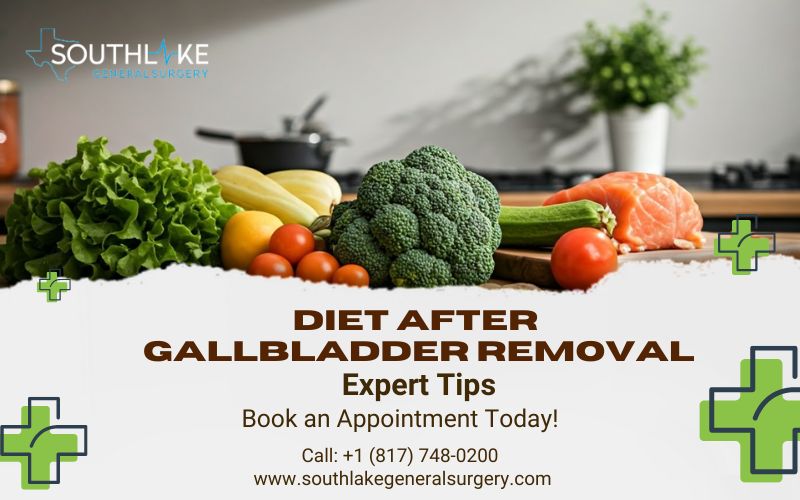Diet tips after gallbladder removal are important for good recovery and long-term stomach health. Gallbladder removal surgery is a frequently performed procedure. Give your body a reasonable amount of time to adjust thereafter.
Choosing the right foods can support your healing process and reduce discomfort. Each person’s recovery journey is unique, but many individuals find that they can gradually return to enjoying regular foods by making thoughtful choices.
Key Highlights
- After gallbladder removal surgery, your body will need some time to adjust to digesting food without a gallbladder.
- It’s essential to adjust your diet while you’re recovering. This typically involves reducing fat intake and incorporating specific nutrients into your diet.
- Following a well-balanced diet plan after gallbladder removal surgery can be beneficial in avoiding digestive issues such as diarrhea and bloating.
- It’s essential to grasp the dietary adjustments necessary for maintaining long-term digestive health following surgery.
- This article provides valuable insights on which foods can enhance your recovery and digestion, as well as those you might want to steer clear of.
Understanding Gallbladder Removal Surgery
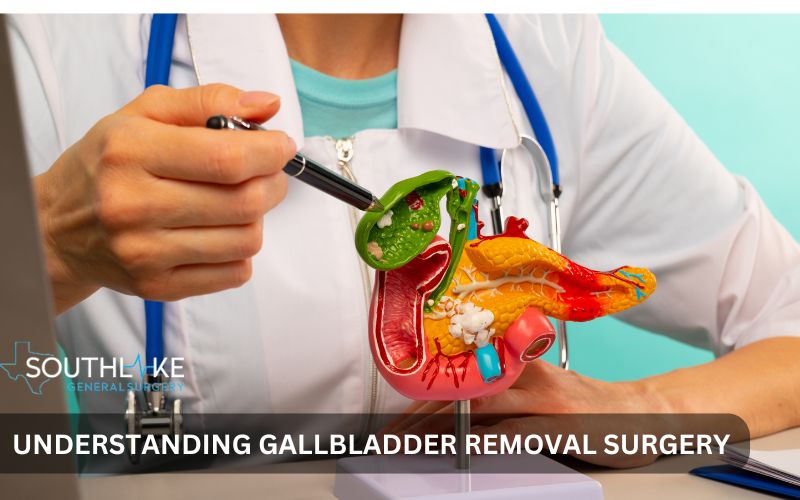
Gallbladder surgery, which is called cholecystectomy, involves the removal of the gallbladder. This little organ stores bile that is made by the liver. When there are problems like gallstones or inflammation, doctors often suggest this surgery as a helpful option.
When it comes to gallbladder surgery, you generally have two primary options: open surgery and laparoscopic surgery. A larger incision is made in the abdomen during open surgery. Laparoscopic surgery, in contrast, utilizes smaller incisions along with specialized tools.
Laparoscopic surgery is preferred by many doctors. This is because it provides a less invasive option with a faster recovery time.
The Role of the Gallbladder in Digestion
The gallbladder plays a key role in digestion. Bile is secreted by the liver and is stored in the gallbladder. The gallbladder secretes bile into the small intestine in response to fatty food consumption.
When fats are emulsified, they break down into smaller components, and bile is an essential component in this process. This facilitates the enzymatic breakdown of fats. Bile plays an essential part in the body’s ability to absorb fats and fat-soluble vitamins.
When a gallbladder is not there, the liver will still make bile. The bile is transported directly to the small intestine. The consistent presence of bile may result in discomfort during the consumption of fatty foods.
Why Gallbladder Removal (Cholecystectomy) is Performed
Gallbladder removal, which is referred to as cholecystectomy, is a procedure that is commonly needed to treat issues like gallstones and inflammation in the gallbladder. Surgical intervention is necessary when gallstones obstruct the bile ducts or cause pancreatitis.
In cases of persistent inflammation or recurrent gallstones, healthcare providers may suggest surgical removal to alleviate symptoms and avert potential complications. It is essential to have a conversation with your healthcare provider regarding your requirement for gallbladder surgery.
In certain cases, laparoscopic surgery may be more advantageous than open surgery, as it facilitates a quicker recovery process.
Immediate Diet Changes Post-Surgery
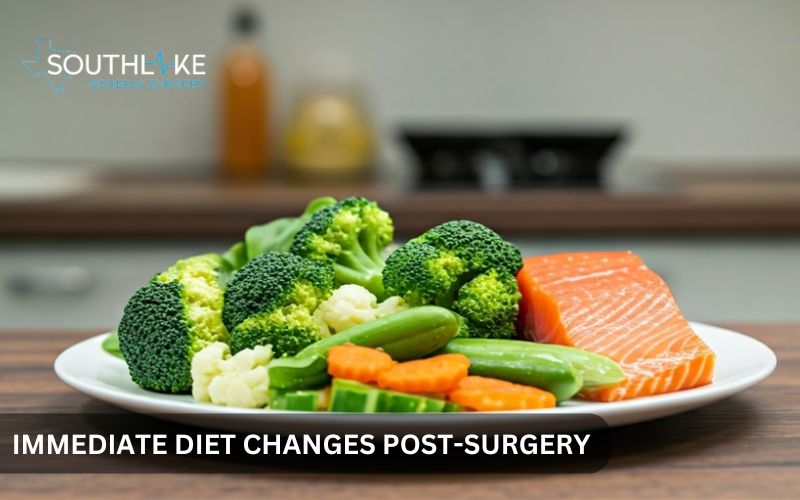
The days following gallbladder removal surgery are quite significant. A special diet is required after gallbladder removal. It’s common to start by enjoying some clear liquids. This gently encourages your digestive system to begin functioning again at a gradual pace.
As you start to feel better, you’ll shift to a diet that’s low in fat and gentle on your digestion. Once you’re ready, you can start reintroducing your regular foods gradually. Making this gradual adjustment will allow your body to adapt more effectively and reduce any discomfort you might experience.
Foods to Temporarily Avoid After Surgery
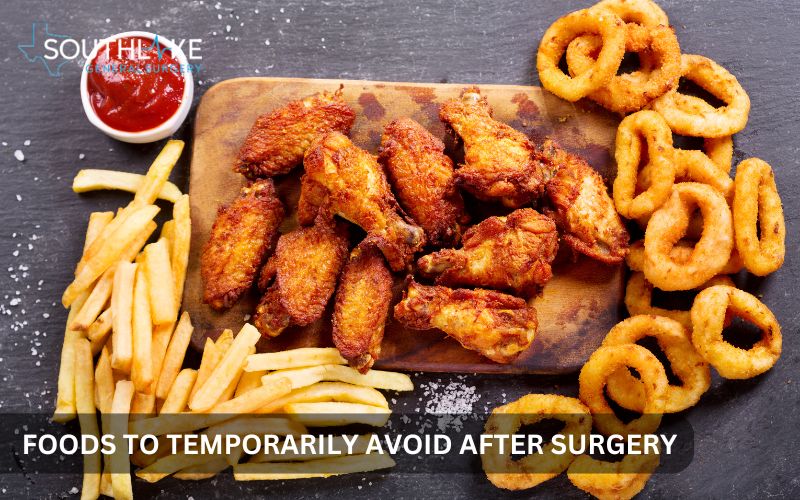
In the first weeks of recovery, you might find that certain foods can cause some discomfort in your stomach. It’s wise to stay away from these foods:
- Fatty foods: These might be a bit challenging to digest. They could lead to some digestive issues like diarrhea, bloating, and discomfort. This includes fried foods, fatty meats, full-fat dairy items, and greasy meals.
- Spicy foods: Some gastrointestinal issues may be caused by spices. These can sometimes cause heartburn or indigestion. It’s a good idea to avoid spicy meals, hot peppers, and strong seasonings.
- Gas-producing foods: These may lead to bloating and discomfort. It’s beneficial to stay away from beans, as well as some vegetables like broccoli and cauliflower, along with fizzy drinks.
Ideal Foods to Introduce Into Your Diet
As you make progress, pay attention to the foods that your body finds easy to digest. Before you begin, consider the following:
- Clear liquids: Start by enjoying beverages such as water, clear broth, diluted juice, and ice pops.
- Bland foods: When you start feeling comfortable with clear liquids, it’s an ideal time to give bland foods a try! There are some excellent choices for you to enjoy, like toast, plain rice, crackers, and applesauce!
- Low-fat protein: Feel free to add some delicious grilled or baked chicken, fish, beans, lentils, and low-fat yogurt to your meals!
Long-Term Dietary Management
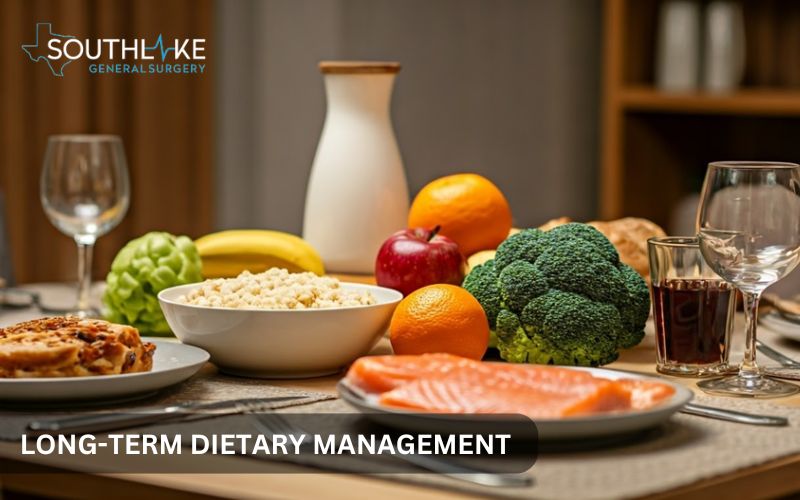
At the start, it’s important to follow a specific diet closely. Once those initial weeks are behind us, we’ll shift our attention to developing lasting eating habits that promote healthy digestion. It’s necessary to choose your food wisely and be mindful of how your body reacts.
Maintaining a balanced diet is beneficial for both your health and digestion! It’s important to include a mix of fruits, vegetables, whole grains, and lean proteins for a balanced diet. Staying hydrated is extremely essential too! It supports your digestive system in functioning effectively.
How to Adapt Your Diet for Better Digestion
Adjusting your diet can support your digestion after gallbladder removal. Here are a few easy adjustments you might consider trying:
- Smaller, more frequent meals: Why not consider having five or six smaller meals throughout the day instead of just three large ones? It can be a great way to keep your energy up! This helps to prevent your digestive system from becoming overwhelmed by excessive fat all at once. It also helps the bile to be released gradually.
- Fiber intake: Increasing your fiber intake can enhance your bowel movements, but it’s recommended to make those changes gradually. Soluble fiber, which you can find in oats, beans, and lentils, is quite beneficial for your health! This substance dissolves in water, creating a gel that can aid in digestion.
- Hydration: Staying hydrated throughout the day is really important! Keeping yourself hydrated is beneficial for your overall health and supports digestion. This can also be beneficial in preventing constipation, a common issue that may arise after gallbladder removal.
Nutrients and Supplements to Support Your Digestion
To keep your digestive system in proper working order, it is essential to consume enough nutrients. Check out these useful tips:
- Healthy fats: It’s significant to keep an eye on fat intake but remember that some healthy fats play a vital role in our diet. Select modest portions of avocados, nuts, seeds, and olive oil.
- Vitamins: Including a variety of fruits, vegetables, and whole grains in your diet will give you essential vitamins. It’s an ideal plan to talk to your doctor about the possibility of taking supplements, particularly for vitamins A, D, E, and K.
- Calcium: If you’re not consuming a lot of dairy, it’s important to ensure you’re still getting enough calcium in your diet. Explore additional options such as leafy greens, fortified plant milk, and tofu!
Monitoring and Adjusting Your Diet After Cholecystectomy
After surgery, it’s important to pay attention to what your body is saying to you. Everybody responds in their own different way. It’s a good idea to make some adjustments depending on how your body responds.
Listening to your body is important. It helps with digestion and assists your recovery. Maintaining open lines of contact with your physician is crucial. Using this method, problems that may emerge can be quickly resolved.
The Importance of Keeping a Food Diary
Maintaining a food journal is an easy and helpful method to monitor how your body reacts to various foods. It’s ideal to keep track of every meal and snack you enjoy!
Be sure to pay attention to any digestive issues you might experience.
- Keep a record of the types and quantities of food you consume daily.
- Note the time of day when you eat.
- Track your bowel movements to find whether they are consistent.
- Over time, you might start to see some patterns emerge. These patterns can help you identify which foods may cause discomfort.
This practice is a great way for you and your healthcare provider to gather important information together. Identifying the foods that cause problems can help you make positive changes to your diet.
Making these changes can really support your well-being and assist in managing your symptoms.
Signs You Need to Adjust Your Diet After Gallbladder Removal
After gallbladder removal, it’s possible to experience some digestive issues. Noticing these signs is really important! Making this change can assist you in modifying your diet:
- Diarrhea: If you often experience loose stools, particularly after eating, it could indicate some difficulty with fat digestion. It might be a good idea to consider eating less fat and choosing lower-fat foods.
- Bloating: Feeling bloated or experiencing abdominal swelling can be quite unpleasant. Eat less food, more often, and avoid gassy foods if you can.
- Abdominal discomfort: It could be necessary to make even more dietary changes if you have persistent abdominal pain or cramping.
Conclusion
It’s good to remember that adjusting your diet after gallbladder removal surgery is a process that requires some time. It’s important to be conscious of how your body feels. Incorporating nutritious foods into your diet is beneficial, and being mindful of your eating habits is important too.
If you need support during this time, consider reaching out to a doctor, such as Dr. Valeria Simone at Southlake General Surgery.
Maintaining a food diary is a great way to keep an eye on your eating habits. It’s important to pay attention to any digestive issues you might experience.
If you ever feel it’s necessary, reaching out to a professional for help is a great idea! This can assist you in recovering more effectively and feeling great over time.
Make an Appointment
If you have any concerns following your gallbladder removal, consider scheduling a meeting with Dr. Valeria Simone, MD, at Southlake General Surgery in Texas, USA. She’ll be happy to help you out!
Feel free to give us a call on +1 (817) 748-0200 to schedule your appointment! Dr. Simone is great at providing helpful advice to support your recovery journey. She is available to assist you in making dietary changes that will promote good digestive health after surgery.
Collaborating with a specialist can guide you in managing dietary changes and addressing any related concerns effectively.
Frequently Asked Questions
What are the prevalent adverse effects following the removal of the gallbladder?
Usually, the side effects after gallbladder removal are temporary and tend to resolve quickly. You might notice some symptoms such as nausea, vomiting, diarrhea, constipation, or bloating. In general, these symptoms will go away as your body adapts to the changes.
Will I be able to get back to a regular diet after my gallbladder surgery?
There may be dietary restrictions for diet after gallbladder removal. But many people can get back to their old eating routines after a while. Your digestive tract will adjust to the regular bile flow.
Are there any foods I should permanently avoid?
Maintaining an accurate food diary is a challenging task for diet after gallbladder removal. However, cutting back on fatty foods, dairy, coffee, and other symptom-inducing items may help some people feel better. People who suffer from inflammatory bowel disease or irritable bowel syndrome should pay special attention to this.
How soon after surgery can I start exercising?
How soon you feel better, and the nature of your surgery will determine when you can return to activity. Typically, you should be fine with moderate exercise after a week. After consulting with your surgeon, you should progressively increase the intensity of your workouts. Make sure your wounds and stitches are completely healed before you begin.
What should I do if I experience digestive issues even after adjusting my diet?
It is recommended that you consult a gastroenterologist or a certified nutritionist if your digestive problems persist despite making dietary changes. After reviewing your symptoms, they will be able to suggest adjustments. Additional testing may be conducted if considered necessary.
Medically Reviewed By: Dr. Valeria Simone MD
Board-certified General Surgeon at Southlake General Surgery, Texas, USA.
Follow us on Facebook and YouTube.
References:
- Shin Y, Choi D, Lee KG, Choi HS, Park Y. Association between dietary intake and postlaparoscopic cholecystectomic symptoms in patients with gallbladder disease. Korean J Intern Med. 2018 Jul;33(4):829-836. doi: 10.3904/kjim.2016.223. Epub 2017 Nov 10. PMID: 29117670; PMCID: PMC6030420.
- Nguyen PK, Lin S, Heidenreich P. A systematic comparison of sugar content in low-fat vs regular versions of food. Nutr Diabetes. 2016 Jan 25;6(1):e193. doi: 10.1038/nutd.2015.43. PMID: 26807511; PMCID: PMC4742721.
- Institute for Quality and Efficiency in Health Care (IQWiG). “In brief: How does the gallbladder work?” InformedHealth.org – NCBI Bookshelf, 27 Apr. 2021, www.ncbi.nlm.nih.gov/books/NBK279386.
- Zackria, Rasiq, and Richard A. Lopez. “Postcholecystectomy Syndrome.” StatPearls – NCBI Bookshelf, 28 Aug. 2023, www.ncbi.nlm.nih.gov/books/NBK539902.
- —. “Laparoscopic Cholecystectomy.” StatPearls – NCBI Bookshelf, 23 Jan. 2023, www.ncbi.nlm.nih.gov/books/NBK448145.

